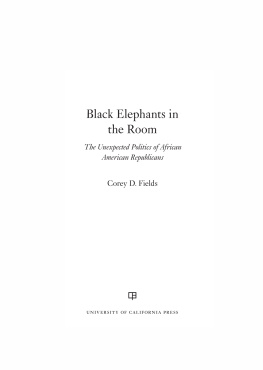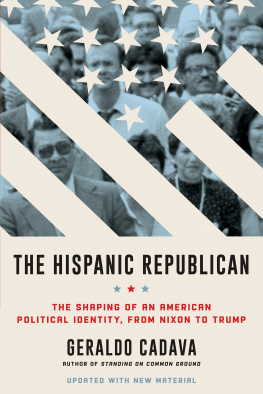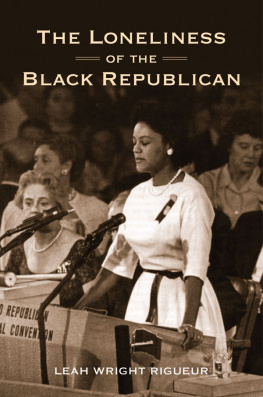ACKNOWLEDGMENTS
I am indebted to the African American Republicans who agreed to participate in this study. This research was possible only because they allowed me into their lives and organizations. For many of them, that required a great deal of courage and did not come without risk. I appreciate their openness and honesty, and I am grateful they trusted me with their stories.
I began this project as a graduate student in the Northwestern University sociology department and completed the book while an assistant professor at Stanford University. Each institution has provided invaluable support, without which I would not have been able to complete this research. There are too many people to thank by name, but I appreciate the kindness and generosity of spirit that is the cornerstone of the intellectual communities in both institutions.
I have to thank Wendy Espeland for being a great mentor, adviser, colleague, and friend. This achievement would not have been possible without her help. Gary Alan Fine taught me the value of a quick mind, an observant eye, and thick skin. Together, they showed me that sometimes your toughest critics could also be your loudest cheerleaders. Wendy Griswold, Monica Prasad, and Reuel Rogers have provided invaluable feedback throughout the process of collecting data, data analysis, and writing. You all are my models for the kind of scholar I hope to become.
While at Northwestern, I not only met great scholars but also made great friends. Many people there demonstrated both sets of skills in providing feedback at various points throughout this project. I benefited greatly from the intelligence and insight of a large group of people: Elisabeth Anderson, Jean Beaman, Nicola Beisel, Ellen Berrey, Kieran Bezila, Japonica Brown-Saracino, Bruce Carruthers, Michaela DeSoucey, Kerry Dobransky, Gabrielle Ferrales, Jeremy Freese, Daniel Galvin, Murielle Harris, Steve Hoffmann, Marcus Hunter, Nina Johnson, Terence McDonnell, Mary Pattillo, Zandria Robinson, Brian Sargent, Heather Schoenfeld, Emily Shafer, Art Stinchcombe, Berit Vannebo, Celeste Watkins, and Harvey Young. The Culture Workshop and Ethnography Workshop at Northwestern helped incubate the project when it was in its infancy. The members of both workshops helped shape the final project in ways that made it better.
Since I arrived at Stanford, I have been welcomed into a vibrant intellectual community. My colleagues in the sociology department and at the Center for the Comparative Study of Race and Ethnicity provided enriching environments that grounded me as I refined the analysis and wrote this book. Whether through reading groups, hallway conversations, or formal presentations, I received valuable feedback from H. Samy Alim, Jennifer Brody, Al Camarillo, Lauren Davenport, Duana Fullwiley, Amir Goldberg, David Grusky, MarYam Hamedani, Allyson Hobbes, Toms Jimnez, Ana Raquel Minian, Susan Olzak, Paolo Parigi, Vaughn Rasberry, Aliya Saperstein, Gary Segura, C. Matthew Snipp, Sara Soule, Jesper Srenson, Mitchell Stevens, Cristobal Young, and Patricia Young. The Institute for Research in the Social Sciences at Stanford hosted a manuscript workshop that was critical in rethinking important elements of this book. Discussions of this work (and all the other research presentations) at the Migration, Ethnicity, Race, and Nation Workshop in the Stanford sociology department never failed to make me think about this project in new and creative ways.
I also had the great fortune of having scholars from outside my home institutions comment on this research. I appreciate the thoughtful feedback provided by Amy Binder, Patrick J. Egan, Tyrone Forman, Cybelle Fox, Karen Trapenberg Frick, Alice Goffman, Arlie Russell Hochschild, Jennifer Johnson, Monica McDermott, Chris Parker, Vensa Rodic, Larry Rosenthal, Laura Stoker, and Amy Wilkins. Thanks, as well, to all the panelists and audience members who listened to parts of this work at conferences, seminars, and workshops over the years. Their comments, questions, and suggestions have improved this project in ways they probably could not have imagined.
Naomi Schneider at the University of California Press gave me the opportunity to turn a bunch of quirky ideas about an even quirkier group into a real book. Her insight was matched only by her patience. This book is better for having landed in her capable hands. I also owe a debt of gratitude to Letta Page. She slayed, and the book is better as a result. I would also like to thank the production staff at the press for all their help and diligence in getting the book published.
Michelle Jackson read (and improved) every version of this manuscript. She went above and beyond the call of duty and Ill be forever grateful. Writing this book would have been infinitely more difficult and lonely without her in the office next door. Koji Chavez and Marion Coddou came through with invaluable research assistance and mad trivia skills. I can only hope that I have been as helpful to all three of them as they were to me.
There were many people from my non-academic life who offered support and encouragement that sustained me throughout completing this project. The Wednesday Night CrewAshleigh, Annie, Carrie, Kate, and Nancykept me sane for years. Who knew pizza and reality television could be so critical to the development of sociological thinking? I am embarrassed to think about the number of sociology conversations Mark Gurley, Matthew Herrmann, Kim Kline, and Tezza Yujuico were forced to endure. Their patience in listening and responding infused this project with a measure of much-needed common sense. Brian Piech, Ed Gutierrez, Laura Deanovic, Paul Wade, and all my friends from 3rd Street kept me healthy and sane as I finished the book. Chrissy Stimmel has been a caring friend with words of wisdom that kept me grounded throughout this process.











